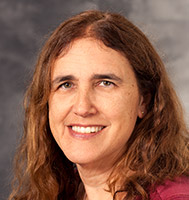Anna Huttenlocher, MD
Position title: Professor
Address:
Division of Allergy, Immunology & Rheumatology
For Academic Inquiries: (608) 265-4003

Education
BS, Oberlin College, Oberlin, Ohio
MD, Harvard Medical School, Boston, Massachusetts
Internship, Boston Children’s Hospital, Boston, Massachusetts
Residency, Pediatrics, University of California, San Francisco, San Francisco, California
Chief Residency, Pediatrics, University of California, San Francisco, San Francisco, California
Fellowship, Pediatric Rheumatology, University of California, San Francisco, San Francisco, California
Professional Activities
Dr. Anna Huttenlocher is tenured professor in the Division of Allergy, Immunology, and Rheumatology and in the Department of Medical Microbiology and Immunology. She also holds an affiliate appointment in the Department of Medicine. Mentoring the next generation of physicians and biomedical scientists is an integral component of her work. Huttenlocher currently serves as associate director for faculty development and education at the University of Wisconsin Comprehensive Cancer Center (UWCCC). She is also on the council for the Association of American Physicians and at the National Institute of Arthritis and Musculoskeletal and Skin Diseases. Huttenlocher was elected to the National Academy of Medicine and is a senior editor at the Journal of Cell Biology.
Clinical Interests
Huttenlocher is a pediatric rheumatologist and physician-scientist with expertise in treating autoimmunity and immune dysregulation. She is particularly interested in autoinflammatory disease and inherited disorders that alter immunity and inflammation.
Research Interests
Huttenlocher’s research focuses on understanding inflammation and its resolution. Her lab investigates how external cues and cell signaling networks regulate immune cell migration during tissue damage and repair and how this is altered in human disease. The Huttenlocher laboratory uses live imaging to visualize and manipulate leukocyte motility in zebrafish and human cells. The Huttenlocher lab team has used these tools to uncover mechanisms that regulate resolution of innate immune inflammation. Her laboratory is also engineering human induced pluripotent stem cells (iPS) to generate human neutrophils that have immunomodulatory functions that can be applied to treatment of patients with uncontrolled infection or cancer.